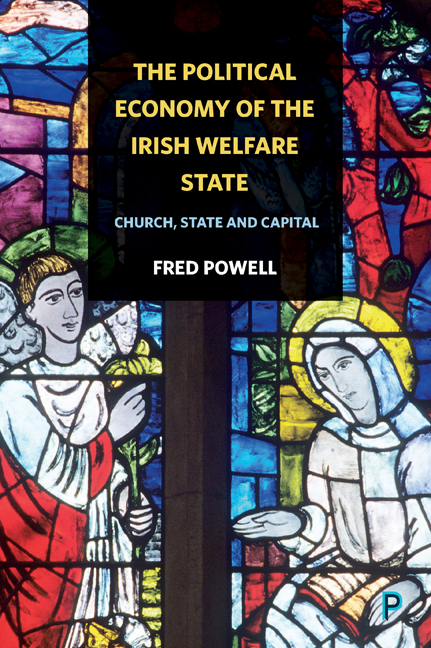Book contents
- Frontmatter
- Dedication
- Contents
- Preface
- Introduction
- one Why the welfare state matters
- two Revolution, culture and society
- three Welfare in the Free State
- four Religious nationalism, sectarianism and anti-semitism
- five The welfare state debate
- six Poverty and social inequality
- seven Liberty, gender and sexuality
- eight The marketisation of the welfare state
- nine Crisis, austerity and water
- ten Conclusion
- References
- Index
three - Welfare in the Free State
Published online by Cambridge University Press: 08 April 2022
- Frontmatter
- Dedication
- Contents
- Preface
- Introduction
- one Why the welfare state matters
- two Revolution, culture and society
- three Welfare in the Free State
- four Religious nationalism, sectarianism and anti-semitism
- five The welfare state debate
- six Poverty and social inequality
- seven Liberty, gender and sexuality
- eight The marketisation of the welfare state
- nine Crisis, austerity and water
- ten Conclusion
- References
- Index
Summary
I think we were probably the most conservative revolutionaries that ever put through a successful revolution.
Kevin O’Higgins (Minister for Justice), Dáil Debates, 1 March 1923Political life in the newly independent Irish Free State, even in the immediate aftermath of a revolution, reflected in obvious ways the essential conservatism of the predominantly rural Irish electorate. Law and order were rigorously maintained and the books carefully balanced. The party in power, composed in the main of elements of the Sinn Féin Party that had accepted the Treaty of 1921, quickly won the support of those sections of the Irish community most likely to benefit from stability – the businessmen and merchants, the larger farmers and shopkeepers, the remnants of Anglo-Ireland anxious for security and the kind of middle-class men and women who had earlier put their trust in respectable politicians of the Irish parliamentary party. The ruling Cumann na nGaedheal party had the support of the major national daily papers the Irish Independent, Cork Examiner and Irish Times and of the Churches.
Terence Brown (1985: 45)These two portraits of post-revolutionary Ireland capture its essential conservatism. It is a view shared by other cultural commentators, who accused the new state of being ‘sectarian, utilitarian and provincial’ (Ferriter, 2005: 346). In policy terms, the Free State looked backwards to the British Conservative Party between 1895 and 1905. The Liberal reforms, which introduced a raft of social legislation after the 1906 UK general election – including the Pensions Act 1908, the Children Act 1908 (popularly known as the Children's Charter), the People's Budget 1909, the National Insurance Act 1911, alongside free school meals provision – were systematically undermined by the new Cumann na nGaedheal (later Fine Gael) government. These progressive social measures were in line with wider European path development towards a welfare state, following the Bismarckian social reforms in Germany during the 1880s. Cormac O’Grada (1995: 441) concludes, ‘the Free State also acquired some of the trappings of a proto-welfare state. Cumann nGaedheal affected a flintier attitude towards social welfare’. It sought to reverse the European tide of social reform in Ireland. Instead, as Michelle Norris (2016: 71) argues, the new state developed a ‘property-based welfare state’ through land redistribution to smallholders and the landless rural population. This chapter seeks to analyse the meaning and content of welfare in the Free State.
- Type
- Chapter
- Information
- The Political Economy of the Irish Welfare StateChurch, State and Capital, pp. 65 - 98Publisher: Bristol University PressPrint publication year: 2017



